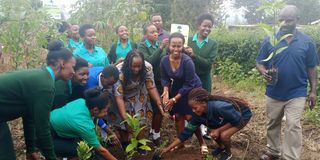Make formal environmental education more practical

What you need to know:
As Uganda continues to be a natural resource-based economy, which is likely to persist into the foreseeable future, the state of environment and natural resources remains a major determinant of the wellbeing of citizens
The purpose of practical formal environmental education in schools is to inculcate knowledge, awareness, positive attitudes and behaviour in the long run. This is on assumption that awareness and positive attitude among students are key in ensuring development.
As Uganda continues to be a natural resource-based economy, which is likely to persist into the foreseeable future, the state of environment and natural resources remains a major determinant of the wellbeing of citizens. Problems such as degradation in Uganda have long been recognised.
Formal environmental education was taught in schools in the early 1980s as nature study but despite the efforts, environmental degradation has been escalating within the past years.
Uganda’s State of Environmental Report 2018/2019 underscored the need of practical formal environmental education. It is important in promoting sustainable environmental conservation behaviour among the public.
The continued environmental degradation in Uganda raises questions about the nature of formal environmental education attained.
Given that environmental degradation in Uganda is as a result of human activities indicates that people have not developed environmentally responsible behaviour. For instance proper disposal of plastics is still a challenge.
Therefore, there is need to adjust the mode of delivery for imparting environmental knowledge. Students are more likely to master and remember what they see than what is discussed and written on black and white boards.
On August 12, Daily Monitor published an article titled “Patriotic education essential for youth”. When it comes to patriotism, youth are taught to love and sacrifice for the country. It is important to note that patriotic citizens are more likely to embrace environmental education.
Students stand a high chance of practicing what they are passionate about. It requires discipline for someone to be able to conform to environmental conservation, thus you cannot protect what you are not passionate about.
It is observed that there is always no actual classroom observation on the teaching and learning of formal environmental education in schools.
Therefore, formal environmental education should focus on awareness and sensitivity to the environment, knowledge and understanding of the environment, the impact of people on the environment, attitudes and values that reflect feelings of concern for the environment.
Uganda’s primary school syllabi has little content on environmental degradation and sustainable utilisation of the environmental resources. There is hardly any content that emphasises development of skills, positive attitudes and environmentally responsible behaviour among learners. This could result in learners accumulating knowledge which may not influence their attitude and hence not lead to environmentally responsible behaviour.
Knowledge about the environment does not mean that a person will behave in an environmentally friendly manner.
Thus, environmental education should draw its emphasis on learning through observation, inquiry, and discovery to pave way for environment neutrality.
Environmental education is more effective in schools where teachers link what they teach with outdoor activities in established centres. By matching their lessons with outdoor activities, teachers increase the probability experiential learning taking place in unique environments such as forests, estuaries, and fresh water habitats.
There should be a balanced representation between classroom activities and outdoor environmental education activities in order to expose students to first- hand learning experiences in direct contact with an outdoor setting. The assumption behind outdoor activities is that such an experience should be able to foster higher understanding, permanent retentive knowledge, motivation, and application to solve subsequent environmental issues and problems. The goal is to manage the environment for climate resilient livelihood and sustainable economic development.
Going forward, teachers should use videos during class sessions to disseminate information about dangers of environmental degradation because students are more likely to visualise everything.
The visual and auditory nature of videos appeals to a wide audience and allows each student to process information in a way that’s natural to them.
Lastly, Ugandans need to join efforts in grooming future responsible citizens that will help build a better Uganda.
Barbra Kembabazi




